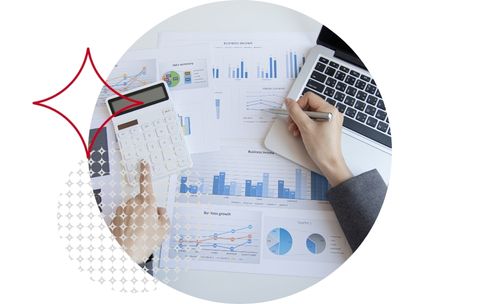Guide to Self-Employment Business Expenses
Sign up for a sole trader account with Moneycorp.

Understanding business expenses
7 minute readIf you are self-employed, you, like all companies, will incur some costs in running your business. When it comes to calculating your taxable profits for HM Revenue and Customs (HMRC), you will need to subtract allowable self-employment business expenses from your overall revenue. But what are allowable expenses, and how do you claim them in the UK?
What is an allowable expense?
The costs you incur in the everyday running of your business are known as allowable expenses. These self-employed business expenses aren't taxable, which is why you need to deduct them from your overall revenue when calculating your taxable profits.
Business expenses differ from personal expenses, which you cannot include in your income tax calculation.
Many allowable business expenses for the self-employed are straightforward, such as buying office stationery or paying a supplier for stock, while other expenses can be a little trickier. For example, if you have a contract for a mobile phone that you use for work and personal calls, you will need to calculate what proportion of your monthly bill is due to work calls and include that amount only when calculating your allowable expenses.
What business expenses can I claim as a self-employed Sole Trader?
To help you understand what's what, here's a quick overview of some common sole trader business expenses for self-employed people.
Here are some of the physical items you can claim as allowable expenses:
- Office costs - such as stationery and your landline at your business premises
- Uniforms, protective clothing and costumes for actors and entertainers
- Travel costs - like public transport fares for business purposes or petrol for your vehicle using business mileage.
- Items you purchase to sell, such as raw materials or stock.
There are other less tangible, tax-deductible financial costs you can claim as allowable business expenses too:
- Bank charges, overdraft, and credit card costs – you can only claim up to £500 if you use cash basis accounting (see below).
- Insurance for your business premises
- Advertising and marketing costs, like the costs involved in setting up and running a website.
- Staff costs, such as payment for subcontractors
- Business premises costs, business rates, heating and lighting, and business-related training courses.
- Legal costs
Cash Basis Expenses
Cash basis is one way to work out your business expenses. It’s often described as simplified expenses. This is particularly suitable for small businesses, as well as sole traders, who turnover less than £150,000 a year. It is much less complex than the alternative (more on this later) and can be done yourself or with the help of an accountant.
Cash basis looks at the money going in and out of your business, less the expenses you can claim, and at the end of the tax year, you'll calculate your Income Tax based on that accounting period. So, instead of recording your income by invoice date, you record it when you're paid. This means you only have to pay Income Tax on income in the year that you actually receive it.
Trading Allowance
A Trading Allowance, also known as a Trading Income Allowance, is a £1,000 per year tax exemption for self-employed people using cash basis for their accounts and people who make a small extra income on occasional work.
It allows you to claim tax relief on your income up to £1,000. It also means that you don't have to fill in a self-assessment tax return if you make less than £1,000 during the tax year. Although, it's important to note that the trading allowance doesn't apply in all circumstances and may cancel out other tax allowances. If you’re unsure, you can contact HMRC, or speak to a tax specialist to advise you.
Traditional Accounting
Traditional Accounting records your income by the dates you were invoiced or billed.
It's more suited to bigger or more complex businesses, and you're required to use traditional accounting if you turnover more than £150,000 per year. Although, if your business grows unexpectedly over the £150,000 limit, you'll still be able to use cash basis accounting, provided you don't exceed £300,000 until the next financial year.
Capital Allowances
A capital allowance is another type of tax relief for businesses, allowing you to deduct some or all of the value of an item before you pay tax. You can only claim capital allowances if you use traditional accounting. You can claim capital allowances on things that fall into the category of 'plant and machinery' for business use. These includes the following:
- Equipment
- Machinery
- Business Vehicles – e.g., vans, lorries, business cars
Personal and Business Use
If you purchase and use something for business and personal reasons, you can only claim allowable self-employed expenses for the business costs involved and not for the total amount you spend.
For example, if you use your mobile phone for business and personal calls, and your bills for the year add up to £200. Of that, you spent £150 on personal calls and £50 on business calls. You can claim £50 for business expenses, and not £200.
If you work from home, you might also be able to claim a proportion of your costs for expenses like Council Tax, electricity, heating, internet and telephone use, and mortgage interest or rent. If you plan to do this, you will need to find a reasonable way to divide your costs between your business and private expenses - like by the amount of time you spend working at home or the number of rooms in your home that you use for business.
Paying tax on foreign income
If you earn money from overseas or you have an international business, you'll have to pay UK tax if you are domiciled in the UK. Your tax commitments will only change if your residence status changes. You'll usually have to spend fewer than 16 days in the UK or be working abroad full-time for this to apply.
If some or all of your income is paid in foreign currency, however, it can be helpful to use a foreign exchange specialist to manage any risk associated with fluctuating exchange rates. If the value of your earnings in your home currency changes, it will impact your tax requirements.
How to claim self-employed business expenses in the UK
To claim business expenses, you will need to include them on your self-assessment tax return. You can make filing this return easier for yourself by keeping track of all your bank statements, receipts, etc, throughout the year.
The basic steps are to register for self-assessment, complete your tax return on paper or online, and file the return by the deadline. HMRC will notify you regarding the amount of tax you owe and you’ll then pay your self-assessment tax bill by 31 January.
Sign up for a sole trader account with Moneycorp.
Keeping track of your business-related payments is an essential part of properly handling your self-employment business expenses. Enquire about a sole trader account with Moneycorp for seamless, secure and supported international payments.
Discover our solutions
Tips on making the most for your money when you emigrate
Our News Hub offers plenty of easy-to-read guidance on how to emigrate abroad.



